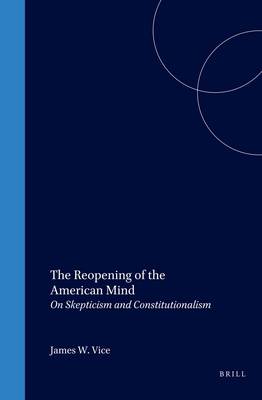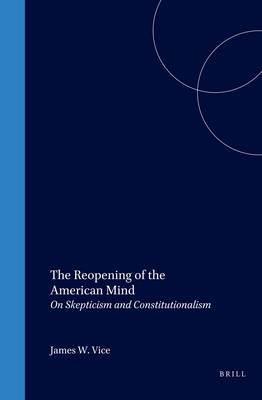
- Afhalen na 1 uur in een winkel met voorraad
- Gratis thuislevering in België vanaf € 30
- Ruim aanbod met 7 miljoen producten
- Afhalen na 1 uur in een winkel met voorraad
- Gratis thuislevering in België vanaf € 30
- Ruim aanbod met 7 miljoen producten
Zoeken
€ 227,45
+ 454 punten
Omschrijving
The Reopening of the American Mind: On Skepticism and Constitutionalism explores the connection of moderate skepticism with attachment to constitutionalism through the thought of five writers. The features of this skepticism were concisely delineated by James Madison in the 37th Federalist as a recognition of the complexity of political matters, the limitations of human reason, and the shortcomings of language. The position was first articulated by Cicero who connected it with the idea of a mixed or republican constitution developed by trial and error over generations. Cicero was influential in the world of David Hume, Edmund Burke, and Madison. The skeptical/constitutional connection found its most articulate recent advocate in Supreme Court Justice Felix Frankfurter and underlay his advocacy of judicial restraint.
Current events have revived interest in the primacy of the legislative branch in balancing interests and rights, in the States as laboratories for democracy, and in an experimental approach to the solution of social problems in what might be called a reopening of the American mind.
The five central chapters explore the skeptical/constitutional connection and the spirit of moderation in these political thinkers. Without an appreciation of this tradition of avoiding dogmatism, people will continue to demand simple answers to complex problems. The book is not, however, primarily a tract for the times but a reflection on the on-going search for a more civil world.
Current events have revived interest in the primacy of the legislative branch in balancing interests and rights, in the States as laboratories for democracy, and in an experimental approach to the solution of social problems in what might be called a reopening of the American mind.
The five central chapters explore the skeptical/constitutional connection and the spirit of moderation in these political thinkers. Without an appreciation of this tradition of avoiding dogmatism, people will continue to demand simple answers to complex problems. The book is not, however, primarily a tract for the times but a reflection on the on-going search for a more civil world.
Specificaties
Betrokkenen
- Auteur(s):
- Uitgeverij:
Inhoud
- Aantal bladzijden:
- 296
- Taal:
- Engels
- Reeks:
- Reeksnummer:
- nr. 69
Eigenschappen
- Productcode (EAN):
- 9789042005211
- Verschijningsdatum:
- 1/01/1998
- Uitvoering:
- Hardcover
- Formaat:
- Genaaid
- Afmetingen:
- 155 mm x 235 mm
- Gewicht:
- 648 g

Alleen bij Standaard Boekhandel
+ 454 punten op je klantenkaart van Standaard Boekhandel
Beoordelingen
We publiceren alleen reviews die voldoen aan de voorwaarden voor reviews. Bekijk onze voorwaarden voor reviews.











